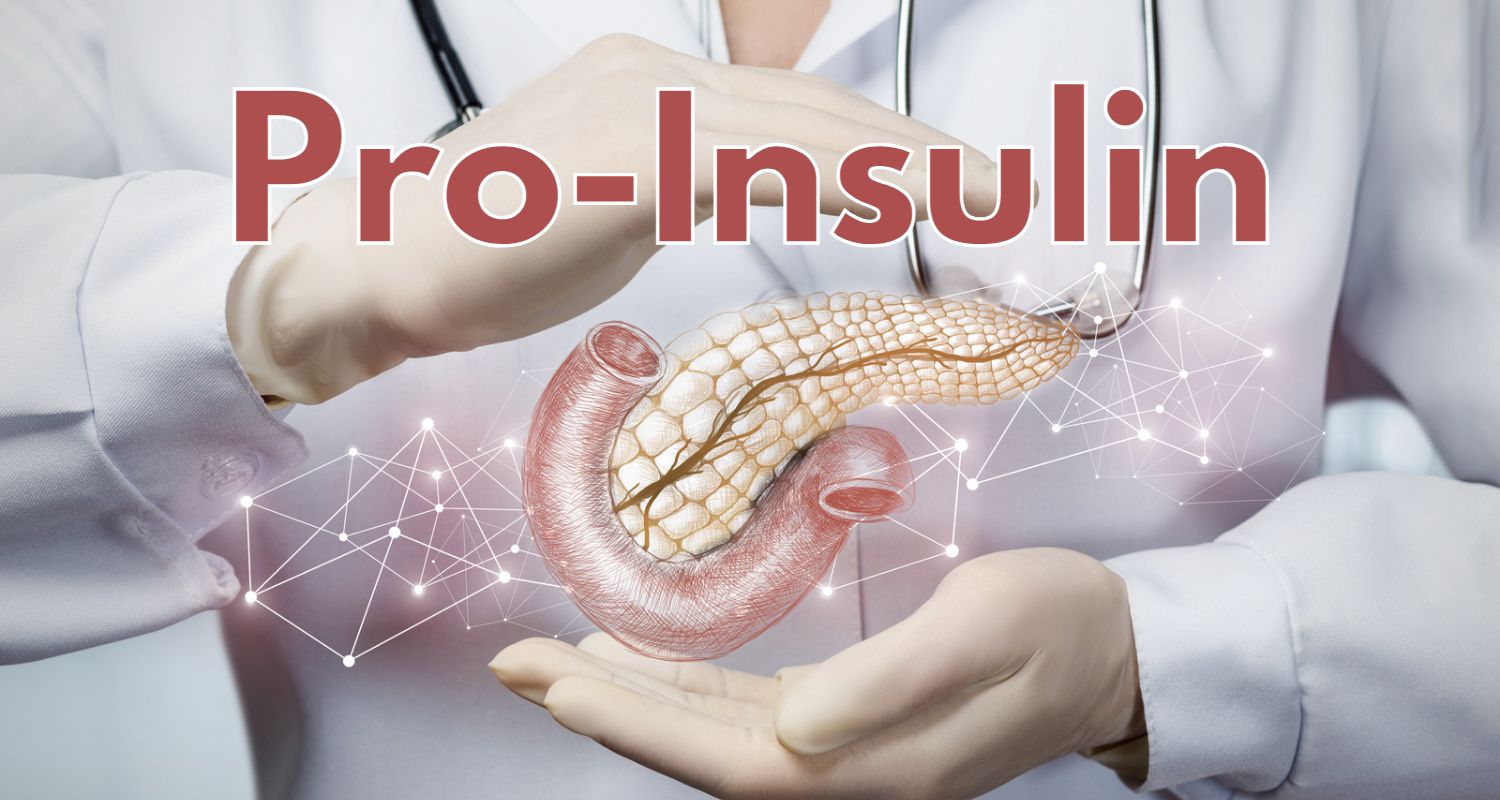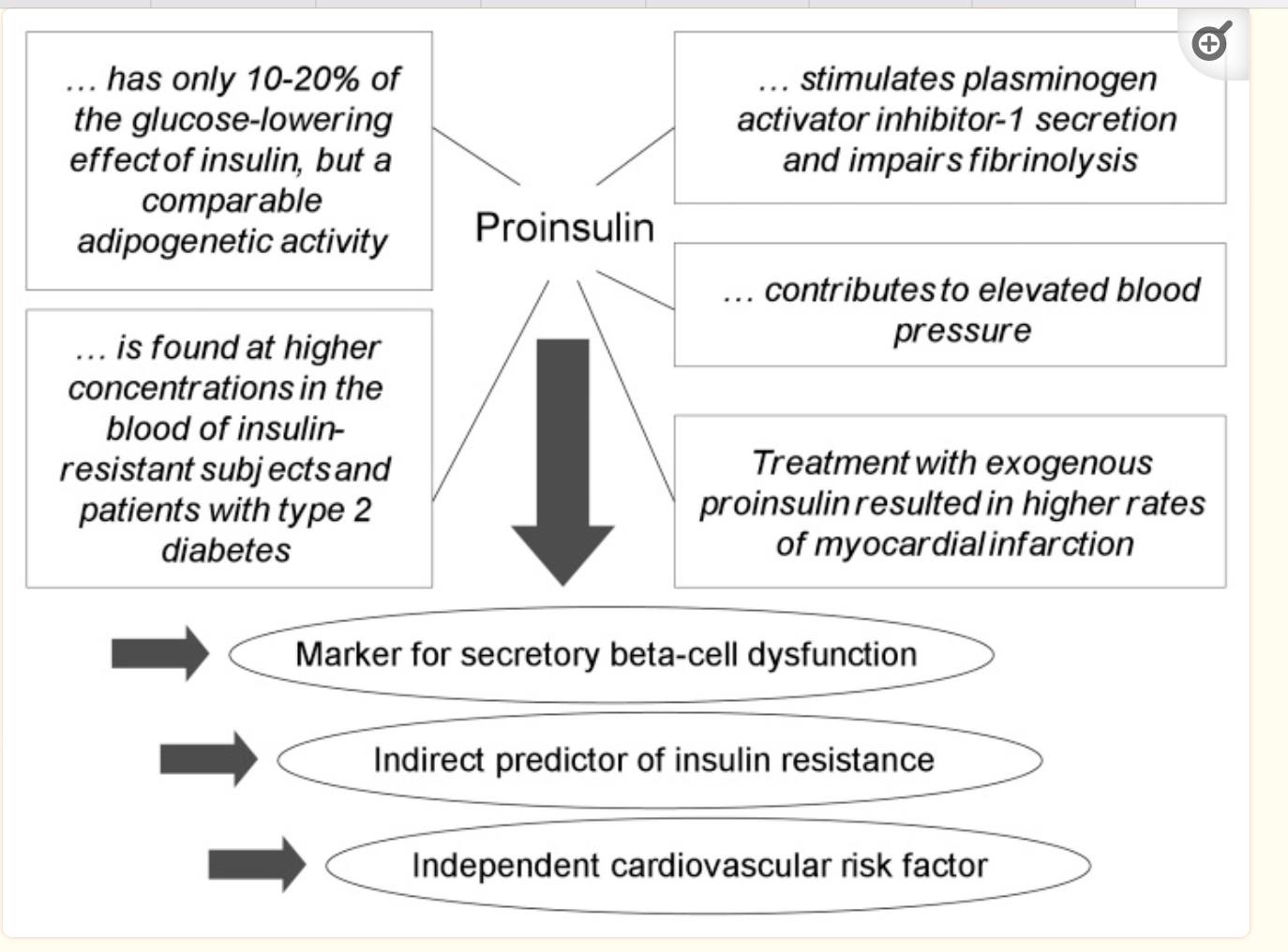PRO-INSULIN by Jeff Cyr

Blog image created with Canva

I'm going to write/talk about something I've never seen mentioned anywhere on social media sites, something VERY important in the development in some folks that have early impaired glucose tolerance (elevated glucose levels to carb load), and very important for those that go on to develop full blown (Frank) T2 diabetes. I'm talking about the conversion of pro-insulin to insulin, insulin and C-Peptide...
Our pancreatic beta-cells make and store the preformed form of insulin as pro-insulin. Our pancreatic beta-cells secrete/release stored pro-insulin, as insulin and C-Peptide. About 5% of the proinsulin does not convert to insulin and C-Peptide.....In people that have impaired glucose tolerance, people that have T2D, the secretory capacity of the beta-cell changes, now we have anywhere from 25-50% of the storage form of insulin, proinsulin, when it is secreted from the beta cell, up to 50% stays as proinsulin, does not convert to insulin and C-Peptide.....Proinsulin binds to the insulin receptors, but unlike insulin, it does not lower glucose (Maybe 10% of what insulin does), but proinsulin has the same fat storing ability of insulin..
BTW = As a side note-Injected insulin that T1 diabetics and some T2 diabetics inject is just insulin, NO pro-insulin, no C-Peptide, just insulin.
✅ "Intact proinsulin binds to the insulin receptor. However, it has only 10-20% of the glucose-lowering effect of insulin but comparable adipogenetic activity."
"Impaired beta-cell secretory capacity induces disproportionately elevated serum proinsulin levels, such as found in subjects with T2DM and impaired glucose tolerance."
Elevated Intact Proinsulin Levels Are Indicative of Beta-Cell Dysfunction, Insulin Resistance, and Cardiovascular Risk: Impact of the Antidiabetic Agent Pioglitazone
Intact pro-insulin levels is also a predictor of insulin resistance and CVD risk.
✅ "Beyond its role as a direct biomarker for beta-cell dysfunction, measurement of intact proinsulin values has also emerged to be an important indirect predictor for IR and individual cardiovascular risk"
Disproportionately increased proinsulin levels are associated with the insulin resistance syndrome
IRIS II study: intact proinsulin is confirmed as a highly specific indicator for insulin resistance in a large cross-sectional study design
Role of intact proinsulin in diagnosis and treatment of type 2 diabetes mellitus
High blood sugar increases the enzymes that makes fibrin, proinsulin inhibits the process of fibrinolysis, the process of breaking down of the enzyme that breaks apart fibrin in the blood.. Fibrin impedes the flow of blood, causes blood clots.
✅ "Current evidence suggests that proinsulin contributes to the excess incidence of cardiovascular disease in T2DM by stimulating plasminogen activator inhibitor-1 secretion and the consecutive inhibition of fibrinolysis"
Role of Intact Proinsulin in Diagnosis and Treatment of Type 2 Diabetes Mellitus
They've clearly shown that by measuring the levels of intact pro-insulin to insulin and C-Peptide, that higher levels of intact pro-insulin shows up, up to 7 years prior to folks having pre-diabetes, diabetes. Just to be clear, I'm talking about T2 diabetes, NOT T1 diabetes.
✅ "Intact proinsulin is a biomarker for pancreatic β-cell dysfunction. In large prospective studies in nondiabetic subjects, elevated intact proinsulin predicted development of type 2 diabetes and/or macrovascular events up to 7 years in advance. This study was performed to evaluate a new semiquantitative lateral flow-based point-of-care rapid test (POCT) for elevated intact proinsulin (cutoff: 15 pmol/L). The test requires 10 µL of capillary whole blood, with visual readout after 5 minutes. It is best applied at 2 hours after a glucose challenge or a meal."
Clinical and Laboratory Evaluation of a New Specific Point-of-Care Test for Intact Proinsulin
So we have
- Beta-cell processing defect.. Proinsulin is 3-4 fold times higher in T2D==impaired processing of proinsulin in beta-cells. Impaired beta-cell secretory capacity.
- Proinsulin to insulin ratio reflect degree of beta-cell dysfunction
- Intact proinsulin levels are 3-4 fold higher in those with impaired glucose tolerance(IGT) and T2D, less insulin and C-Peptide
- Impaired beta-cell secretory capacity.
- These folks eat the standard high carb diet, this causes higher demand on the pancreatic beta-cells, this makes the beta-cells become more impaired, more proinsulin to insulin ratio released. What a wonderful life.
- High proinsulin values reflect impaired beta-cell secretory capacity, Insulin resistance and increased cardiovascular risk.
- Most Docs, ADA telling folks to eat these crazy high carb diets, more demand on beta cells. More demand on these folks beta cells. Folks in this situation with more demand on beta-cells, MORE beta-cell secretory issues, more pro-insulin to insulin..
✅ "An elevated proinsulin-to-insulin ratio is caused by increased secretory demand on β-cells due to insulin resistance and continuous hyperglycemia"
Increased β-Cell Workload Modulates Proinsulin-to-Insulin Ratio in Humans
Then we have a few more research papers on this topic.
✅ "Fasting proinsulin levels may serve as a marker of β-cell dysfunction and predict type 2 diabetes (T2D) development. Kidneys have been found to be a major site for the degradation of proinsulin."
Fasting Proinsulin Independently Predicts Incident Type 2 Diabetes in the General Population
✅ "In this large cohort of a predominantly middle-aged population, we found fasting proinsulin levels were independently associated with incident T2D. Proinsulin levels have been shown to be associated with T2D parameters, including glucose and insulin resistance, in different cohorts. Similarly, in the cross-sectional analyses, we found strong correlations between proinsulin and risk factors of T2D such as BMI, systolic blood pressure, HDL cholesterol, triglycerides, and FPG. Moreover, during the follow up, we found significant association between proinsulin and incident T2D, which was inconsistent with the initial cross-sectional analyses. Two large studies in men and women in Finland and the US, respectively, reported that higher proinsulin levels are associated with an increased risk of developing T2D "
Fasting Proinsulin Independently Predicts Incident Type 2 Diabetes in the General Population
And then we have this.. "We have identified nine genetic variants associated with fasting proinsulin.

✅ "Conclusions: We have identified nine genetic variants associated with fasting proinsulin. Our findings illuminate the biology underlying glucose homeostasis and T2D development in humans and argue against a direct role of proinsulin in coronary artery disease pathogenesis."
Genome-wide association identifies nine common variants associated with fasting proinsulin levels and provides new insights into the pathophysiology of type 2 diabetes
In closing I would add that lots of experts on YouTube and social media telling T2 diabetics, "Just lose weight", it's about calories in/calories out". "You can do this with a high carb diet". I agree that you will need to lose weight.
I agree that you will need to lose weight, I disagree with the rest. From everything I've seen in myself and thousands of other T2 diabetics online, I strongly disagree, if you want to actually put your T2 diabetes in full remission. If you want to have truly normal, non-diabetic blood sugar/insulin levels. If you want this, then you should adopt a very low-carb diet.
Written by Jeff Cyr
Published: December 2nd, 2022
Dr. Ken Berry MD

Lies My Doctor Told Me Second Edition
Dr. Jason Fung MD

The Diabetes Code: Prevent and Reverse Type 2 Diabetes Naturally
Dr. Benjamin PhD

Why We Get Sick: The Hidden Epidemic at the Root of Most Chronic Disease - and How to Fight It
Robert H. Lustig MD

Metabolical: The Lure and the Lies of Processed Food, Nutrition, and Modern Medicine

